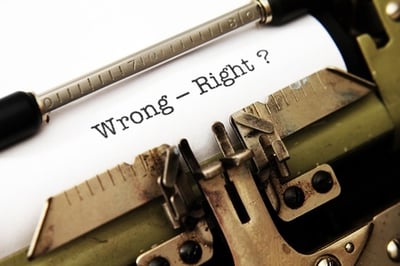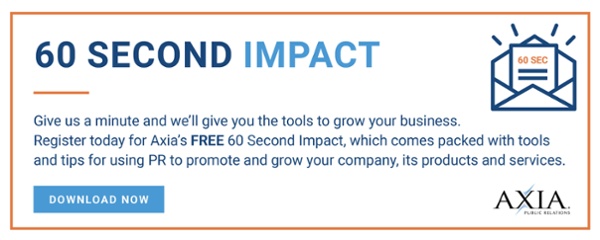 By Alexandria Easland
By Alexandria Easland
As a public relations student at San Diego State University, I am interested in the ethical issues that arise around the profession. To that end, I recently spoke with Jason Mudd, CEO and president of the Axia Public Relation firm. Not only did Mudd reveal how he got interested in and involved with the profession, but also the standards he holds himself, his employees and his clients to in terms of ethics. Below is my interview with Mr. Mudd.
Q: Why did you decide to go into public relations?
A: I initially went to college for journalism and was dependent on working my way through school. I got a scholarship from the Rotary Club to the University of Missouri. A Rotarian and board member of a non-profit organization wanted me to help the organization build awareness for its cause. There, I saw an opportunity to move from journalism to PR, where I could advocate for good causes. While a student at Missouri, I worked in the student recruiting office in the School of Journalism, which was also the school’s journalism alumni relations office and journalism career center. I began doing clerical work and soon they had me doing PR work. Everyone told me I was great at it! I realized that I liked the business side of business. I like creating news and being part of the strategy and direction.
Q: As CEO and president of Axia Public Relations, do you deal with ethical issues on a daily basis?
A: Yes. I think that every day, you make an ethical decision to do the right thing. Every day, you have the opportunity to make the right decision and set the right example
Q: Being accredited in public relations, you have to be committed to PR’s ethical practice. Why do you consider ethics so important in public relations?
A: My clients are dependent on my team, and we strive to give them sound PR advice. If we’re not being ethical and honest with them, then we can’t give them good advice. If they don’t trust us, we don’t have any credibility. Relationships are all about trust; PR is all about relationships.
Q: I’ve noticed you do a lot of speaking at colleges. Is your target audience there – college students? Do you talk about your ethical approaches at those events?
A: About half of my speaking engagements are at universities, and when I’m speaking to colleges, my audience is predominantly the students. The topic of ethics is always part of my presentation, especially during Ethics Month (September).
Q: Can you tell me about an ethical conflict you have encountered?
A: We refer to ethics in our contracts. We must follow the Public Relations Society of America’s (PRSA) code of ethics and we put a link to that code in each of our client, employment and vendor agreements so that our clients and team are aware of the terms and our respect for and expectations of following them. If we can, we like to go through the code with clients before the engagement begins.
This summer, a company hired us and we ended up getting into an ethical disagreement with its leaders. They reported to us that they were struggling with product reviews: Many product reviews on the Internet were negative. They asked us to help them manufacture positive reviews online. We explained to them that this would be unethical and they were very upset. We told them that they should look at negative feedback as a productive way to improve the product. We also told them to encourage real customers with positive experiences to share their positive reviews online. That turned into a bone of contention: They thought part of our job was to put “our spin” on things. We shared with them articles that we published on our blog and other external articles about the FTC taking action against such companies – and their PR firms – that demonstrated how unethical and unwise the practice is. Creating false reviews is a slippery slope.
The truth is that if you are not teaching ethics to your employees, ethical issues will come up. Your employees will inevitably speak on behalf of the company. In this case, our initial decision was right: “No, we absolutely won’t do that.” We would have been putting our reputation on the line. Our employees would have been on the hook then, too, for potential liabilities for ethical violations if we had honored the client’s request.
Q: What do you see being one of the biggest problems/mistakes people make when dealing with ethics in the workplace?
A: I think, at the end of the day, perhaps many of the ethical violations that I see other PR people making are maybe violations of ethics that came with good intentions. When we take on new clients, we want them to succeed and we want them to have good reputations. Some people will take shortcuts. Maybe they would be tempted to post fake good reviews because they want to give that company a good reputation, but the truth is that if it is fake, you shouldn’t do it. To me, that is the biggest mistake: under-emphasizing ethics. Ethics are generally top priority.
There is a professional member code of ethics from the PRSA and a lot of professionals in this industry don’t know those ethics. They may read them, but I don’t think they really know or understand them. I didn’t know them until I became accredited; one-third of the exam was on ethics. I learned a lot about ethics and it was a very rewarding experience. Ignorance is a part of it, too. If people don’t know or understand the code, they certainly can’t apply it. A PR professional should never hide from the truth.
You can’t hide behind non-profit organizations either. For example, we have a client today whose competitor has created an association. That association, by all appearances, is legitimate, but it is illegitimate in how it operates. The only active member of the association is the company that wrote the check to get it started. To create an association and control that association’s appearance as being independent is unethical. I was on the company’s Twitter [page] today and it talked about how great the company is that sponsors it. That’s like saying, “We are a non-profit, and everything we do benefits a corporation.” That is unethical and likely illegal. It creates confusion in the marketplace. No one knows that backstory; everyone just sees how great that company is positioned from the association. That is a strategic benefit to the competitor, but it isn’t an honest or ethical representation.
Q: Do you have a key phrase, or things you tell those who come in to work for you, about ethics?
A: There are three things we look for in every person we hire: First, we look for ethics – work ethic, character and integrity; we look for good writers – even the best writers can get better; and we look for people who understand the difference between a strategy and a tactic (most professionals, unfortunately, don’t know what a real strategy is).
Q: What is your feeling about ethics in your profession?
A: Every job offer in our company’s employment agreement comes with an ethics addendum that we ask applicants to sign. It is the PRSA Code of Ethics. We ask our vendors to also bind themselves to those commitments via our vendor agreement.
Unethical decisions caused this country’s recession. You want to do well, so sometimes you are willing to sacrifice those ethics for a short-term gain, and once you loosen up the ethics, you just continue loosening them.
One other thing I want to add: We had a company we were working with that was growing fast and proud of it. Its growth was incredible. At some point, it started talking about how it had 200 employees, then quickly 250 and then 300 and more. It became a slippery slope, and the CEO started creating unreasonable perceptions of growth. He couldn’t keep up with the lie. One day he was out of town and a reporter called and asked HR for the number of employees. HR quoted the reporter a much lower number – less than 200 employees. The question became, “Who has the right information: the CEO or the HR department?” HR didn’t want to undermine the CEO, but the HR person wasn’t prepared – or willing – to tell a lie.
I had to advise the CEO, and I told him that he couldn’t give out false information and misrepresent his company – or my company, for that matter. At the end of the day, he was trying to make an impression with the reporter. For what it is worth, the company’s leaders hired us because they were struggling because of their negative reputation. Ultimately, they ended up closing their doors. I would argue, among other things, that it was because of a lack of ethics within the company culture that said it’s OK to tell a few white lies.
My lesson back to my team – and why we talk about ethics upfront – is that there is no long-term benefit to exaggerating truth. It doesn’t make sense, and eventually it will all catch up to you.
Remember, Warren Buffett said, “It takes 20 years to build a reputation and five minutes to ruin it.”
– Alexandria Easland is a public relations student at San Diego State University on assignment to interview a public relations executive about ethics. She chose Jason Mudd of Axia Public Relations and shared her Q&A for her class on the Axia Public Relations blog.
Featured image credit: 123rf.com
Topics: public relations



Comment on This Article